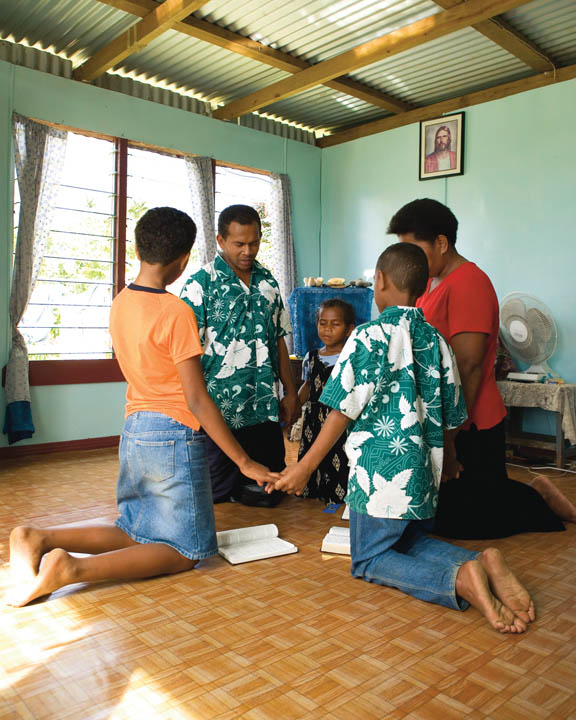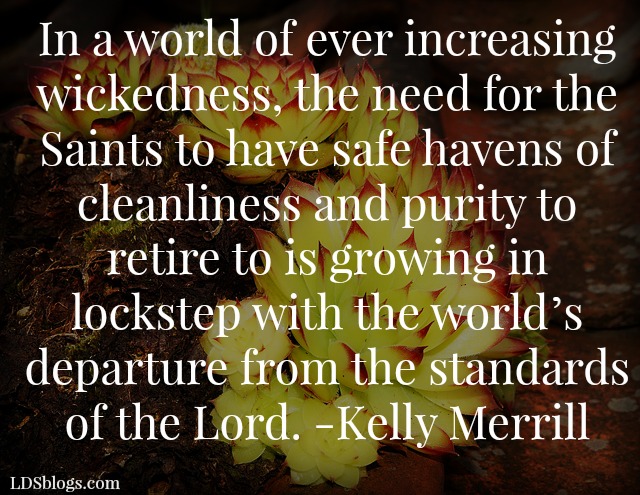In a world of ever increasing wickedness, the need for the Saints to have safe havens of cleanliness and purity to retire to is growing in lockstep with the world’s departure from the standards of the Lord. Isaiah told us that we have three places we can go to, sacred spaces, if you will, that are considered holy places. These places are our homes, our wards and branches, and our temples (Isaiah 4:5 – 6).
Of all the places on earth, these three places should offer the Saints the most sure place to find peace, rest from the cares of the world, and a sacred experience. This ability to be a spiritual refuge from the world’s ways is what makes them holy. Oh, there is a fourth place that is holy, and that includes historically significant places concerned with the gospel of Christ and its progress on earth. Such places as the Garden Tomb where the body of Christ was laid, the Garden of Gethsemane, the Sacred Grove on the Smith farm in upstate New York, the Tabernacle on Temple Square, and places of personal significance in our lives, like where a loved one is buried, etc. All of these places are made sacred because sacrifices were made to create those spaces.
The root of the words sacred and sacrifice are the same. To make something sacred is to dedicate it to deity, to venerate it. To make something sacred requires sacrifice. We have to give up something of value or worth to us for it to qualify as sacred. It must be something of great worth.
Two Types of Holy
 The Lord has told us that these four places are holy to Him. But the benefits of experiencing a holy place are based upon our own worthiness. A holy place is only as holy as the people who enter there. If I enter the temple unworthily, I desecrate that holy place, I don’t experience its holiness. Only if I have repented of my sins and enter worthily can I fully experience the peace and serenity of that holy house.
The Lord has told us that these four places are holy to Him. But the benefits of experiencing a holy place are based upon our own worthiness. A holy place is only as holy as the people who enter there. If I enter the temple unworthily, I desecrate that holy place, I don’t experience its holiness. Only if I have repented of my sins and enter worthily can I fully experience the peace and serenity of that holy house.
How do we make our homes places of holiness? How do we make them the sacred places of refuge the Lord is talking about in the scriptures (D&C 45:32; D&C 87:8; D&C 101:22)? He tells us to go and stand in holy places and to be not moved until He comes again. So, what makes our homes a sacred place of refuge for our children and loved ones?
The Making of a Sacred Space
We had a rule in our house when I was raising my children. I would tell them that the world is becoming an increasingly unsafe place to be. There was to be no back biting, bickering, name calling, or meanness in our home. If we could not come home and feel safe from the meanness and pressures of the world, then where else could we go to find peace? Sure, the adults could go to the temple, but the children could not. It was a family effort to make our home a place worthy of being called a sacred or holy space.
Here are three examples of how we can turn our homes into more sacred and safe places. Some of these examples are derived from an Ensign article published in January, 1980 by Dale C. and Marta C. Mouritsen, entitled, “Making Home a Holy Place.”
-
Beauty and Orderliness
 Having a big home or a fancy home has nothing to do with having the Spirit in our homes. If whatever we live in it neat and orderly, clean and tidy, the Spirit will find joy in being in our home. Chaos is grating to holy beings. God is a god of order. The Savior and the Holy Spirit are no different. They do not require sacred music to be playing all day, with candles and incense, either. Home can be a fun place, as long as what we do in our home is clean and reverent in nature. Note that I did not say churchy in nature.
Having a big home or a fancy home has nothing to do with having the Spirit in our homes. If whatever we live in it neat and orderly, clean and tidy, the Spirit will find joy in being in our home. Chaos is grating to holy beings. God is a god of order. The Savior and the Holy Spirit are no different. They do not require sacred music to be playing all day, with candles and incense, either. Home can be a fun place, as long as what we do in our home is clean and reverent in nature. Note that I did not say churchy in nature.
What we do in our homes is as much a part of making home a sacred place as how we decorate our homes. Reverence, respect, kindness, and generosity are all attitudes that create a sacred place, a place we want to spend time in. Just as following the prophet’s advice and decorating our homes with pictures of Christ, and the temples, raises our thoughts to a higher level, so filling our home with laughter and wholesome activities raises our thoughts and attitudes to a higher level. A good adage is the old saying that cleanliness is next to godliness. Keep it clean and wholesomeness follows.
-
Decide to be Good Parents
Elder A. Theodore Tuttle said, in the Relief Society Magazine, July 1963, p. 484,
“This decision to be parents means to put first the obligation to be baby-sitters, trainers, discipliners, supervisors, teachers, assigners, checker-uppers, planners, story-tellers, exemplars, and, in short, to be common, ordinary, garden variety, old-fashioned, on-the-job, full-time parents.” Admittedly, this advice is a lot harder to follow and execute today than it was in 1963. But the need for it has increased tenfold. When Elder Tuttle made that statement there were no computers, microwaves or cell phones. There was no Internet or cable TV. Life was far less complicated. We need parents who have made the conscious decision to be good parents, now more than ever. We have only a few years with each child before they are grown and on their own. These precious years cannot be retrieved or done over. We must make every day we have with our children count.
-
Self-control in speech and actions
In a world that is increasingly out of control, teaching our children, by example, to speak peaceably one with another cannot be learned outside the home. It is our responsibility to teach our children that we can talk to one another without calling names, accusing, speaking harshly or using unkind or uncouth language. The Spirit will not reside in a home that is filled with contention or ugly language. When we teach respect and respectful language, we invite the Spirit into our homes. Elder Gordon B. Hinckley said,
We seldom get into trouble when we speak softly. It is only when we raise our voices that the sparks fly and tiny molehills become great mountains of contention. … The voice of heaven is a still small voice; likewise, the voice of domestic peace is a quiet voice.
Conclusion
Obviously there are many more things we can do to increase the spirituality of our homes. Making home a sacred place for the family members to come to takes effort and hard work. It is a full-time job. The results of such an effort are incalculable. Our children will learn reverence as an attitude. They will see charity played out and demonstrated by the parents. They will be taught to work and respect others. Gospel principles will be instilled in a new generation. Think what a blessing that will be to your grandchildren and beyond. What we do in our homes to make them holy today will spread a net of good over a whole community tomorrow.
Learn more about these subjects:
https://www.lds.org/ensign/1980/01/making-home-a-holy-place?lang=eng
BY DALE C. MOURITSEN AND MARTA C. MOURITSEN
DENNIS B. NEUENSCHWANDER
Of the Presidency of the Seventy
About Kelly P. Merrill
Kelly Merrill is semi retired and writes for https://gospelstudy.us. He lives with his wife in Idaho. His strength is being able to take difficult to understand subjects and break them down into understandable parts. He delights in writing about the gospel of Christ. Writing about the gospel is his personal missionary work to the members of the Church and to those of other faiths who are wanting to know more about Christ's gospel and His Church.







